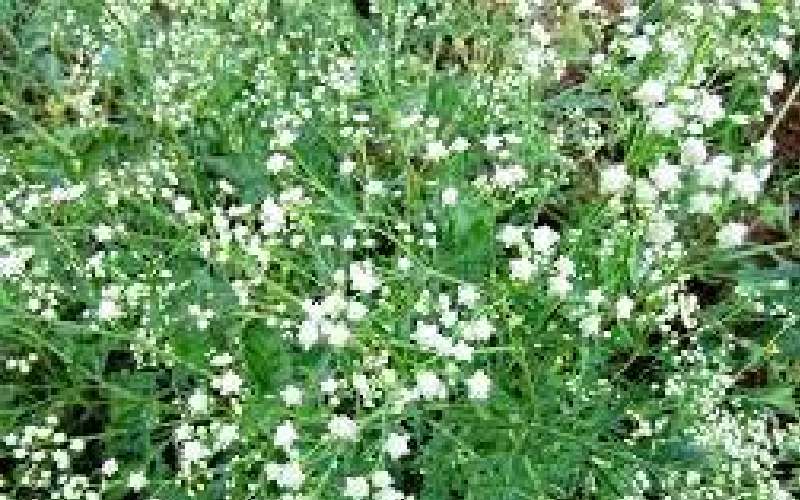
The Parthenium Hysterophorus weed.
The fight against malaria got a major boost after researchers cracked new evidence on a deadly weed that favours mosquitoes.
The International Centre for Insect Physiology and Ecology’s (ICIPE) findings showed the immense threat posed by the highly destructive plant, known scientifically as Parthenium hysterophorus, towards the probable escalation of malaria in East Africa.
The investigators demonstrated that the weed, nicknamed ‘gamine weed’ due to its adverse effects on people’s health, agriculture, livestock and the environment, has contrastingly favourable effects on Anopheles mosquitoes, which transmit the malaria parasite.
Malaria is one of the most severe public health problems worldwide, according to the World Health Organisation (WHO). It is a leading cause of death and disease in many developing countries, where young children and pregnant women are the most affected.
In Kenya, there are an estimated 3.5 million new clinical cases and 10,700 deaths each year, and those living in western Kenya have an especially high risk of malaria.
In a study published on July 20, the ICIPE researchers noted the possibility of exploiting the Parthenium-mosquito relationship to control the insects.
“In general, mosquitoes lay their eggs in stagnant water. However, we have established that Parthenium releases from its roots chemicals known as terpenes that have a distinct blend of mosquito-attractive fragrances. When these chemicals leak into stagnant water, they enhance its attractiveness as an egg laying site for mosquitoes, in comparison to plain water,” explains Prof Baldwyn Torto, the head of ICIPE’s Behavioural and Chemical Ecology Unit.
He adds: “As our research further demonstrates, this preference has major implications on the ability of mosquitoes to survive and thrive. The Parthenium root chemicals enable mosquito larvae to emerge two to three days earlier, and they also extend the lifespan of the adult mosquitoes arising from the contaminated breeding sites to a week longer than normal, thus boosting their chances to bite people and transmit the malaria parasite.”
The findings are especially significant considering that Parthenium – a native of North and South America and one of the world’s most devastating invasive plants – is widely spread across East Africa, including in flood-prone malaria endemic zones.
Parthenium aggressively colonises its invaded regions, killing other plants and reducing crop yields. It also produces a highly toxic compound called parthenin that causes dermatitis, hay fever and asthma in people, poisons animals and contaminates meat and dairy products in livestock that has fed on it.
In 2015, ICIPE published a seminal study that made the first global connection between Parthenium and mosquitoes. The research demonstrated that the weed is a preferred nectar source for Anopheles mosquitoes and it can sustain these insects by extending their lifespan even in the absence of a blood meal from people.
Moreover, female Anopheles mosquitoes that feed on Parthenium survive longer, accumulate substantial energy reserves and they are capable of laying more eggs. Importantly, the researchers found that parthenin does not have the same toxic effect on adult female mosquitoes as it does on people and animals, indicating that the insects can tolerate and possibly detoxify themselves of the compound.
“Our recent findings present a silver lining in that the chemical fragrances found in the roots of Parthenium could be used as a bait in combination with traps, to selectively capture pregnant female mosquitoes seeking egg laying sites,” explains Trizah Milugo, a Kenyan student who conducted the study as part of her PhD research within ICIPE’s Behavioural and Chemical Ecology Unit.
“We also noted that only half of the eggs deposited in water containing these chemicals hatched. We singled out parthenin as being responsible for the low egg hatch rate, meaning that female mosquitoes can compensate the cost of exposing their juveniles to plant toxins for improved survival as adults.”
“Globally, invasive species are considered one of the most important perils to nature due to their severe impact on many socio-economic aspects,” notes Dr Segenet Kelemu, ICIPE’s director general and chief executive officer. “Africa is one of the most susceptible regions, with a long and diverse list of such menace. Therefore, ICIPE has prioritised the management of invasive species as a key area of focus.”
In addition to the centre’s invasive species initiatives, ICIPE and partners have developed a strategy for managing invasive species in Africa, which focuses on a three-stage approach of prevention, early detection and control, and a ‘One Health’ focus to tackle the cross-cutting impact on human, animal, plant and environmental health.
 The Standard Group Plc is a multi-media organization with investments in media
platforms spanning newspaper print
operations, television, radio broadcasting, digital and online services. The
Standard Group is recognized as a
leading multi-media house in Kenya with a key influence in matters of national
and international interest.
The Standard Group Plc is a multi-media organization with investments in media
platforms spanning newspaper print
operations, television, radio broadcasting, digital and online services. The
Standard Group is recognized as a
leading multi-media house in Kenya with a key influence in matters of national
and international interest.











